|
|
|
Sort Order |
|
|
|
Items / Page
|
|
|
|
|
|
|
| Srl | Item |
| 1 |
ID:
147369
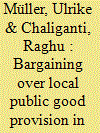

|
|
|
|
|
| Summary/Abstract |
In rural India, decentralized government schemes and assembly constituency development programs represent major channels through which local public good provision is realized. This polycentric governance structure confronts local leaders with a distributional conflict, which is nested in a social dilemma situation. Based on a controlled case study approach, we investigate the provision of small-scale infrastructure in three South Indian communities. Apart from roads and drinking water facilities that directly appeal to the residents of a community, local leaders bargain over infrastructure contracts, which serve as patronage resources in interactions with politicians from higher government levels. A comparative game-theoretic analysis of the results suggests that coordination through political party identities has translated into alternative bargaining strategies and hence varying distributional outcomes regarding contracts and local public goods in the communities under review. The study concludes with recommendations for polycentric institutional design.
|
|
|
|
|
|
|
|
|
|
|
|
|
|
|
|
| 2 |
ID:
161708
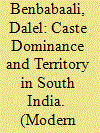

|
|
|
|
|
| Summary/Abstract |
This article argues that taking territory into account is essential to understand the change in the scale and nature of caste dominance in contemporary India. The demonstration is based on an analysis of the socio-spatial trajectories of the Kammas—a dominant caste from Coastal Andhra, where they continue to own most of the land, even though they have migrated in large numbers towards the interior and southern regions of the Indian peninsula, both to newly irrigated areas and to the cities. The key positions they occupy in the politics and economy of Andhra Pradesh confer upon them a hegemonic character. However, this hegemony is threatened by the growing resistance of Dalits to caste and class oppression, while Kamma cultural domination, long contested in Telangana, is now challenged by the formation of the new state.
|
|
|
|
|
|
|
|
|
|
|
|
|
|
|
|
| 3 |
ID:
183683
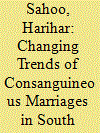

|
|
|
|
|
| Summary/Abstract |
Consanguineous marriage is still a preferred option in many societies of southern India. Therefore, this study addresses the state and district wise variation in consanguineous marriages and also attempts to find out the underlying factors of this practice in different marriage cohorts of South India. Drawing data from National Family Health Survey-4, the result revealed that there is a reduction in consanguineous marriages from 32.6% who married before 1985 to 23% during 2010–2014. About 13 districts in Tamil Nadu had the highest prevalence of consanguineous marriages, indicating that recent socio-demographic changes such as delays in age at marriages, lesser age gaps between partners, increase in the level of education, etc., did not explicitly affect the consanguineous marriages.
|
|
|
|
|
|
|
|
|
|
|
|
|
|
|
|
| 4 |
ID:
126126
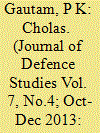

|
|
|
|
|
| Publication |
2013.
|
| Summary/Abstract |
The article addresses the deficit in the indigenous, rich historical knowledge of south India. It does this by examining the military and political activities of the Cholas to understand the employment of various supplementary strategies. The article deals with the engagements and battles of the Cholas with other kingdoms of south India, and 'externally' with Sri Lanka. It begins with an exposition of various types of alliances that were an integral part of the military strategy of the time. It also seeks to historically contextualize modern diplomatic developments and explains some issues of indigenous historical knowledge of that period that are of relevance even in the twenty-first century: continued phenomenon of changing alliance system in politics; idea of India as a civilization; composition of the army; and the falsehood of the uncontested theory of the Indian defeat syndrome.
|
|
|
|
|
|
|
|
|
|
|
|
|
|
|
|
| 5 |
ID:
117602
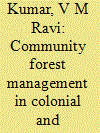

|
|
|
|
|
| Publication |
2012.
|
| Summary/Abstract |
In the past two decades, South Asia has undergone robust reforms in the forestry sector which claim to be initiating a transformation from state-centric to people-centric forest management. This shift is perceived as an important move towards decolonisation in governance processes in India. Examining the forest policies in colonial and postcolonial South India, this article finds, however, that community forest management in postcolonial India remains substantially rooted in the colonial framework of forest resource management policies. In practice, this means that exploitation of forests gives some consideration to the requirements of forest-dependent communities today, but does so now under the control of a state that fails to protect the most basic rights of many of its most vulnerable citizens. The article thus argues critically that supposedly people-centric community forest management in India is not sensitive enough to local development needs, nor indeed sufficiently protective of the basic needs of many forest-dependent people.
|
|
|
|
|
|
|
|
|
|
|
|
|
|
|
|
| 6 |
ID:
116622
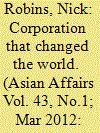

|
|
|
|
|
| Publication |
2012.
|
| Summary/Abstract |
For over 200 years the East India Company was the world's largest corporation. Set up as a merchant trading house in 1600, it became a permanent joint stock company in 1657, the forerunner of the modern multinational. The tension between investment and speculation was reflected in a share price which rose and fell with its fortunes. In the beginning bullion was brought from Britain to pay for Indian goods, which were then shipped to Britain. But in 1766, not long after Clive's victory at the battle of Plassey, the Company acquired the diwani, the right to collect the taxes, in Bengal. A situation of "unrequited trade" was thus established. Suddenly the profits from tax collecting more than covered the cost of trade goods. The dividend, jumped from six per cent in 1766 to 12 per cent in 1769. The shares soared. Then the Company's position in South India was threatened and the share price collapsed. The Company had overwhelming debts, but was judged "too big to fail". It had to be bailed out by the British government, which in return secured the right to nominate representatives to the Bengal Council. Corruption and accountability became increasingly important themes. By the time Warren Hastings was Governor-General the company was purchasing vast quantities of tea from China. What could be sold to China in return? Answer: Indian opium. This trade notoriously led to war with China. But by the end of the Second Opium War, the Indian Mutiny had put paid to the Company's rule over India, though the Company continued a financial existence until 1874.
|
|
|
|
|
|
|
|
|
|
|
|
|
|
|
|
| 7 |
ID:
033429
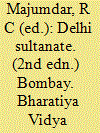

|
|
|
|
|
| Edition |
2nd edn.
|
| Publication |
Bombay, Bharatiya Vidya Bhavan, 1967.
|
| Description |
xxxviii, 882p.: ill., mapshbk
|
| Series |
History and Culture of the Indian people
|
|
|
|
|
|
|
|
|
|
|
|
Copies: C:1/I:0,R:0,Q:0
Circulation
| Accession# | Call# | Current Location | Status | Policy | Location |
| 015983 | 954.0232/MAJ 015983 | Main | On Shelf | General | |
|
|
|
|
| 8 |
ID:
107954
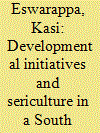

|
|
|
|
|
| Publication |
2011.
|
| Summary/Abstract |
This article demonstrates that certain developmental initiatives have been playing an important role in the socio-economic progress of rural masses in South India and typically involve a number of focused projects. Development of sericulture is shown as a key strategy for supporting backward regions. With particular reference to Kotha Indlu village of Chittoor district in Andhra Pradesh, this article explains the increased returns from sericulture as a result of development programmes. The article concludes with some suggestions to improve the long-term feasibility of sericulture.
|
|
|
|
|
|
|
|
|
|
|
|
|
|
|
|
| 9 |
ID:
141077
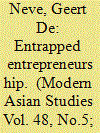

|
|
|
|
|
| Summary/Abstract |
As neoliberal restructuring leads to the rise of labour market intermediaries globally, labour contractors are being vilified as unscrupulous recruiters and as wicked figures who exploit and harass. Based on long-term ethnographic research among workers and contractors in the Tamil Nadu garment industry, this article argues for a more careful and grounded analysis of labour contractors’ role and position under neoliberalization. Evidence is presented of contractors’ precarious position at the tail end of global production networks and three conclusions are drawn. First, contractors reveal themselves to be a remarkably unrecognized source of entrepreneurship, flexibility, and skills acquisition, which facilitates manufacturers’ participation in global markets. Second, despite their resourcefulness and resilience, contractors find themselves trapped between management and the workforce, and in an overall situation of vulnerability as a result of the informal nature of their activities and the vagaries of the neoliberal market. For many of them this results in a highly fluid and unstable class experience, in which they struggle to materialize aspirations for upward mobility. Finally, neoliberal conditions tend to undermine rather than enhance contractors’ entrepreneurial success and to weaken rather than intensify their power with regard to both capital and labour.
|
|
|
|
|
|
|
|
|
|
|
|
|
|
|
|
| 10 |
ID:
155044
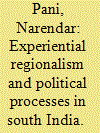

|
|
|
|
|
| Summary/Abstract |
Regional identities have periodically asserted themselves in Indian politics, both before and after Independence. The intensity of this regionalism has, however, tended to vary quite substantially from state to state and over time, ranging from a somewhat benign influence on state politics to demands for secession. These differences are typically explained in terms of specific local political conditions. While the local is undoubtedly important, this article argues that a larger theoretical explanation is also possible: Once we recognize that regionalism operates in multiple spaces, it becomes evident that the way these spaces are experienced has its influence on the practice of local politics. The article goes on to match its theoretical expectations with the politics of regionalism in the neighboring south Indian states of Karnataka and Tamil Nadu.
|
|
|
|
|
|
|
|
|
|
|
|
|
|
|
|
| 11 |
ID:
140942
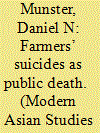

|
|
|
|
|
| Summary/Abstract |
his paper argues that Indian farmers’ suicides may fruitfully be described as public deaths. Based on ethnographic fieldwork in the South Indian district of Wayanad (Kerala), it shows that farmers’ suicides become ‘public deaths’ only via the enumerative and statistical practices of the Indian state and their scandalization in the media. The political nature of suicide as public death thus depends entirely on suicide rates and their production by the state itself. But the power of representations complicates the ethnographic critique of statistical knowledge about suicide. In a context like Wayanad, which had been declared a suicide-prone district by the Indian state, public representations of suicides have taken on a life of their own; statistical categories and the media interpretations of these statistics have had a curious feedback—mediated by development encounters—onto the situated meanings of individual suicides. Local interpretations of individual suicides mostly commented on personal failures of the suicide and on the perils of speculative smallholder agriculture. Ethnography of farmers’ suicide based on case studies alone, however, would soon encounter limitations equally grave as the limitations of statistical analysis. Not only is the meaning of suicide (intentions, causes, motives) at the actor level off limits for ethnography, but in addition to that the (public) meaning of suicide is co-determined by state practice including statistical accounting.
|
|
|
|
|
|
|
|
|
|
|
|
|
|
|
|
| 12 |
ID:
145541


|
|
|
|
|
| Publication |
New Delhi, Oxford University Press, 2016.
|
| Description |
xlvi, 358p.hbk
|
| Standard Number |
9780199463794
|
|
|
|
|
|
|
|
|
|
|
|
Copies: C:1/I:0,R:0,Q:0
Circulation
| Accession# | Call# | Current Location | Status | Policy | Location |
| 058689 | 210.1/BER 058689 | Main | On Shelf | General | |
|
|
|
|
| 13 |
ID:
144314
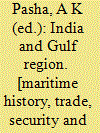

|
|
|
|
|
| Publication |
DelhI, Wisdom Publications, 2014.
|
| Description |
iii, 418p.hbk
|
| Standard Number |
9789381505670
|
|
|
|
|
|
|
|
|
|
|
|
Copies: C:1/I:0,R:0,Q:0
Circulation
| Accession# | Call# | Current Location | Status | Policy | Location |
| 058615 | 337.54053/PAS 058615 | Main | On Shelf | General | |
|
|
|
|
| 14 |
ID:
112986
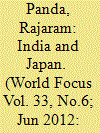

|
|
|
| 15 |
ID:
146581
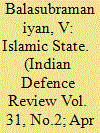

|
|
|
|
|
| Contents |
Competition among fundamentalist groups could push each of them to outdo others who would evolve in a constant state of ‘one-upmanship’. There are already strong indications of such a threat emerging in India. Incidentally, the Al Qaeda’s first cell in the Indian subcontinent was recently uncovered in Sambhal. Given this discovery, the Islamic State’s growth in India will lead to competition among like-minded groups such as Al Qaeda in the Indian subcontinent, which would spur them on to unleash more violence in different parts of India. Constituted by a literate membership, driven by hardcore ideology, the Islamic State in India has essentially become a new brand of terrorism which is as yet unseen in the annals of political violence.
|
|
|
|
|
|
|
|
|
|
|
|
|
|
|
|
| 16 |
ID:
181126
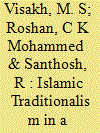

|
|
|
|
|
| Summary/Abstract |
In our ethnography among traditionalist Sunni Muslims of Kerala, South India, we observe the emergence of new intellectual critiques of Islamic reformism and a revival of ‘traditional’ Islamic articulations. A new class of traditionalist Sunni ulama, claiming to be ‘turbaned professionals’, plays an instrumental role in providing epistemic sanctioning to ‘traditional’ Islamic piety while simultaneously grounding it within the discourses and processes of neoliberal developmentalism. Such assertions of traditionalist Sunni Muslim identity challenge the conventional understanding of Islamic reformism as a hallmark of the progressive understanding of faith and traditionalism as its ‘anti-modern’ other. The article argues that this discursive shift of Sunni Islamic traditionalism in Kerala since the 1980s from defensive to more assertive forms has to be located in the context of wider socio-economic change within the community facilitated by structural as well as cultural forces of globalization. We point out that this process traverses the local, national, and global scales of identification, and results in intense negotiations between local identifications and ‘true Islamicate global imaginations’. These negotiations bring in new discourses around the question of ‘authentic’ Islamic practices and sensibilities among the traditionalist Sunni Muslims, forcing us to locate the question of their identity formation beyond the boundaries of communities and the nation states that ensconce them.
|
|
|
|
|
|
|
|
|
|
|
|
|
|
|
|
| 17 |
ID:
082163
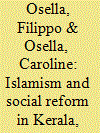

|
|
|
|
|
| Publication |
2008.
|
| Summary/Abstract |
This paper critiques ethnographic tendencies to idealise and celebrate sufi 'traditionalism' as authentically South Asian. We perceive strong academic trends of frank distaste for reformism, which is then inaccurately-and dangerously buttressing Hindutva rhetoric-branded as going against the grain of South Asian society. This often goes along with (inaccurate) branding of all reformism as 'foreign inspired' or wah'habi. Kerala's Mujahids (Kerala Naduvathul Mujahideen [KNM]) are clearly part of universalistic trends and shared Islamic impulses towards purification. We acknowledge the importance to KNM of longstanding links to the Arab world, contemporary links to the Gulf, wider currents of Islamic reform (both global and Indian), while also showing how reformism has been producing itself locally since the mid-19th century. Reformist enthusiasm is part of Kerala-wide patterns discernable across all religious communities: 1920s and 1930s agitations for a break from the 19th century past; 1950s post-independence social activism; post 1980s religious revivalism. Kerala's Muslims (like Kerala Hindus and Christians) associate religious reformism with: a self-consciously 'modern' outlook; the promotion of education; rallying of support from the middle classes. There is a concomitant contemporary association of orthoprax traditionalism with 'backward', superstitious and un-modern practices, troped as being located in rural and low-status locations.
|
|
|
|
|
|
|
|
|
|
|
|
|
|
|
|
| 18 |
ID:
185972
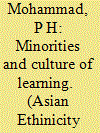

|
|
|
|
|
| Summary/Abstract |
What are the factors hindering educational development among Muslims in India in general and the newly born Telangana state in particular, is the key sociological question confronting the educationists and policymakers? The current paper based on empirical study provides an anthropological perspective to understand a number of socio-cultural factors responsible for lower retention and higher dropout rates among Muslims in public schools across the class and gender lines. It highlights that with positive state interventions, the enrolment and retention levels of Muslim working-class children have increased enormously besides a significant improvement in the same among Muslim girls also. Thus the paper argues that a relaxation in school protocols facilitates Muslim children integrating the academic demands and socio-cultural obligations they deem necessary while addressing culturally sensitive issues in curriculum and pedagogic practices foster attitudinal changes together which contribute immensely to the educational advancement among them.
|
|
|
|
|
|
|
|
|
|
|
|
|
|
|
|
| 19 |
ID:
106502
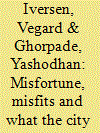

|
|
|
| 20 |
ID:
124974
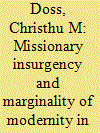

|
|
|
|
|
| Publication |
2013.
|
| Summary/Abstract |
This article argues that despite some efforts by early missionaries, Christians in India have continued to practise various forms of caste prejudice. The multi-dimensional understanding of caste made this issue heavily contested, dividing the Christian communities into two major components of marginal Christians, later known as Dalit Christians, and elite Christians constituting largely Nadars and Vellalas in South India. Despite considerable missionary misgivings about caste identities and resultant discriminations, traditional differentiation carried on and took new forms. This article traces these debates and shows the challenges of opposing caste-based discriminations that continue today.
|
|
|
|
|
|
|
|
|
|
|
|
|
|
|
|
|
|
|
|
|